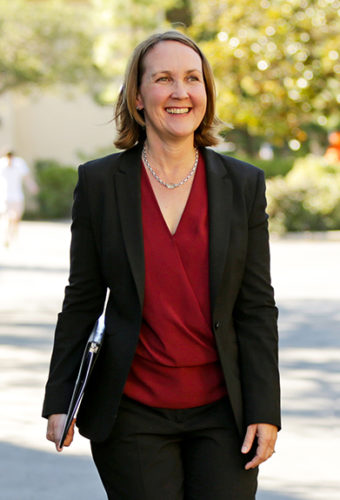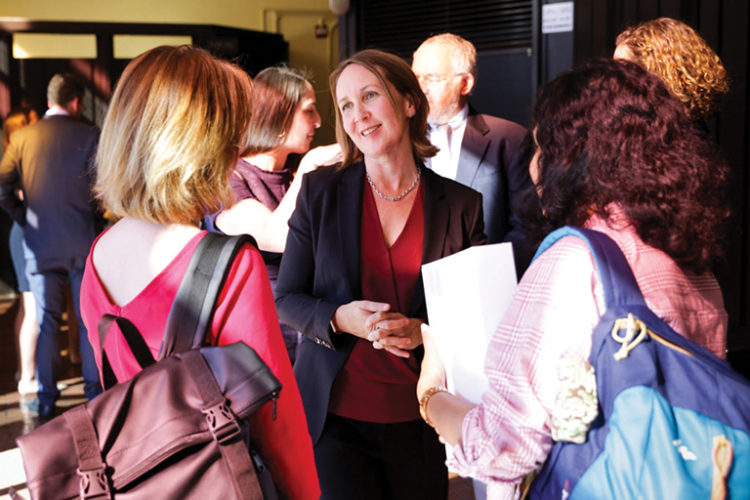Jenny S. Martinez Appointed Stanford Provost
-
By
- Chris Bliss
(Originally published by Stanford Report on August 23, 2023)
An experienced academic leader and prominent legal scholar, Martinez will become the university’s chief academic officer and chief budgetary officer on Oct. 1.

Jenny S. Martinez, dean of Stanford Law School and Richard E. Lang Professor of Law, has been named Stanford’s 14th provost, incoming President Richard Saller announced today.
Martinez will assume her new position Oct. 1. She succeeds Persis Drell, who has served as provost since February 2017 and announced in May that she would step down this fall. A search for a new dean of Stanford Law School will begin immediately; serving as interim dean will be Robert Weisberg, the Edwin E. Huddleson, Jr. Professor of Law and associate dean for curriculum at the law school.
At Stanford the provost oversees academic and budget administration for the university, with direct reports that include the deans of each of Stanford’s seven schools and senior administrators in research, student affairs, budget, undergraduate education, graduate education, and other areas.
Saller, who takes office as Stanford’s president on Sept. 1, said, “Jenny is a highly respected scholar of international law and constitutional law who joined the faculty in 2003 and has served as dean of Stanford Law School since 2019. As dean, she has been a champion of inclusion and a clear and reasoned voice for academic freedom. Jenny and I look forward to promoting the fundamental mission of a great university – that is, excellence in research and education with integrity.”
Saller also offered his thanks to the provost search committee of Stanford community members led by Debra Satz, the Vernon R. and Lysbeth Warren Anderson Dean of the School of Humanities and Sciences.
“I’m honored to take on this role and work in partnership with Richard to get the new academic year off to a good start,” said Martinez. “The fundamentals at Stanford are incredibly strong – among other things, we have the best faculty and students in the world. I am looking forward to listening to members of our community about how best to advance our core missions of education and research in the coming months and years.”
Accomplishments at Stanford Law
Among Martinez’s many accomplishments as dean of Stanford Law School (SLS) is the launch in 2022 of the Sally B. and William H. Neukom Center for the Rule of Law, an interdisciplinary hub that focuses on advancing rule of law around the world through research, education, and practical initiatives to reverse global trends toward autocracy and turn the tide toward accessible, impartial justice and open government. Like the Law School’s other interdisciplinary initiatives, the new center aims to leverage resources and disciplines across the broader university, including expertise housed at the School of Humanities and Sciences, the Freeman Spogli Institute for International Studies, and Stanford Impact Labs.
Nearly half the Law School’s tenure-line faculty have not only law degrees but also PhD degrees in disciplines ranging from computer science and physics to economics and literature. In addition, the school offers 24 joint degree programs, making it an intellectual crossroads on the Stanford campus. During Martinez’s deanship, the school has recruited a number of new faculty whose research spans fields from legal history to artificial intelligence, including domains such as the First Amendment, immigration, human rights, venture capital, and corporate governance.
As dean, Martinez has led many efforts to address affordability, including significantly expanding financial aid resources for SLS students. In the 2022-23 academic year, the school increased its financial aid support by 10% and loan repayment funding by nearly 40%, expanding scholarship amounts for all students on need-based aid and fully covering all tuition costs for JD students with family income below 150% of the poverty line (200% for academic year 2023-24). The school offers a generous loan repayment program – one of the first of its kind in the country – for students who enter public service or public interest practice.

During her tenure, the law school also launched the SLS Opportunity Fund to help students on need-based financial aid cover unexpected expenses, such as needing a suit for a job interview; expanded the number of postgraduate fellowships that help launch students into jobs in governments and nonprofits; and began piloting an innovative income-based loan repayment program.
Advancing diversity, equity, inclusion, and belonging has been a priority for Martinez throughout her career. Prior to her appointment as dean, she chaired a law school working group on diversity and inclusion, consisting of faculty, students, and staff, convened to recommend ways of strengthening the student experience at SLS. The group made recommendations adopted by the school, including new courses and curriculum, and faculty-led workshops on effective pedagogy, new clinical education, and pro bono programming.
As dean, she built on these efforts in a number of ways, including establishing the Stanford Center for Racial Justice, led by R. Richard Banks, the Jackson Eli Reynolds Professor of Law; launching the Stanford Law Scholars summer pipeline program to support low-income and first-generation undergraduates from around the country on their path to law school; and supporting the launch of new alumni affinity groups. The school has also expanded mental health support for students, hiring two full-time counselors as well as promoting workshops and events on mental health.
Martinez’s commitment to diversity includes intellectual diversity, and she has become an important voice on the issues of academic freedom, freedom of speech, and inclusion. Her letter to the community addressing the disruption of Judge Kyle Duncan’s speech at the school in March clearly outlined the legal precedents, as well as the university’s position, on free speech, protests, academic freedom, and the First Amendment as it applies to private universities.
“Jenny has been an outstanding dean of the law school and will be an extraordinary provost,” said outgoing Provost Drell. “She has provided courageous leadership for her school in very difficult circumstances. As a dean she was both deeply committed to increasing access to the law school for students of all backgrounds and supporting her faculty to increase the diversity of the professoriate, while she was also breathtakingly articulate in her stands on issues of free speech and academic freedom. She is fearless, compassionate, and truly dedicated to our mission of research and education. I could not be more pleased by Richard’s choice of a new provost!”
Academic and legal career
In addition to her position as dean and professor of law, Martinez is a senior fellow, by courtesy, of Stanford’s Freeman Spogli Institute for International Studies. Prior to her appointment as SLS dean, she served as associate dean for curriculum from 2013 to 2016.
An experienced litigator as well as a scholar, Martinez teaches courses on constitutional law and international law. She is a leading expert on the role of courts and tribunals in advancing human rights. She is the author of The Slave Trade and the Origins of International Human Rights Law and numerous articles in leading academic journals.
Martinez holds a bachelor’s degree from Yale University and earned her JD at Harvard Law School, where she was managing editor of the Harvard Law Review. She clerked for U.S. Supreme Court Justice Stephen Breyer, Stanford Class of 1959, and Judge Guido Calabresi of the U.S. Court of Appeals for the Second Circuit. Martinez also was associate legal officer for Judge Patricia Wald of the United Nations International Criminal Tribunal for the former Yugoslavia in The Hague, where she worked on trials involving genocide, crimes against humanity, and war crimes.
Martinez is a member of the American Academy of Arts and Sciences and the American Law Institute, and she was recently appointed to the American Bar Association’s Task Force for American Democracy. She previously served as a member of the U.S. State Department’s Advisory Committee on International Law.
